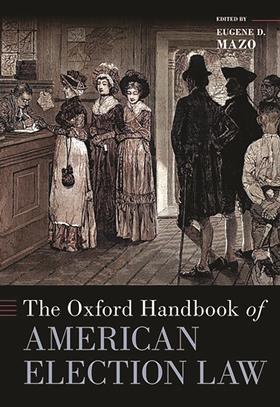The Oxford Handbook of American Election Law
Edited by Eugene D. Mazo
£162.50, Oxford University Press
★★★★★
This impressive handbook offers a comprehensive overview of American election law. Across 44 essays by 47 election law scholars, it introduces the reader to the field’s core topics, provides summaries of its leading cases, guides the reader through key debates, and suggests areas for future research and reform.
Election Law and Race looks into ‘the chasm that often exists between the articulation of a constitutional right and its realization’, despite the promise of equal protection and the unambiguous prohibition on race discrimination, in the 14th and 15th amendments respectively. In the 1960s, following the adoption of the Voting Rights Act (1965), the Supreme Court became more protective of the right to vote. However, it is clear from this handbook that vote denial, based on race, still exists.
Political Corruption considers the prohibition on paying for votes and how the secret ballot was intended to undermine this practice. But does paying people to vote, rather than paying them to vote a particular way, also corrupt the democratic process? In the 2024 US presidential election, America PAC (political action committee) pledged to award $1m daily to voters in swing states. America PAC explained that, although the recipients of the awards were screened and must have values aligned with the group, there was no pledge regarding how they were to cast their votes. The district attorney of Philadelphia argued that the awards were an ‘illegal lottery’. America PAC admitted that the recipients were not chosen at random but selected by the group.

One Person, One Vote explains malapportionment, or gerrymandering, using the example of two counties in Alabama. Bullock County, with a population of 13,462, was allocated two seats in the state House of Representatives, whereas Mobile County, with a population of 314,301, was allocated only three seats. Following the decision of the Supreme Court in Reynolds v Sims (1964), all federal, state and local legislative districts must contain equal numbers of persons.
Counting Votes and Declaring Winners unpacks the ‘hanging chads’ presidential election, ultimately decided by the Supreme Court in Bush v Gore (2000). The book also considers the events of 6 January 2021, ‘the first time that the transition of power from one president to the next was marred by a violent attempt to prevent its occurrence’.
Electoral College reviews the track record of this uniquely American institution created by the 12th amendment (1804). On five occasions, the system of presidential selection has resulted in a president who did not receive the most votes from the nation’s voters. Surprisingly, only 32 states require that their appointed electors pledge to cast their votes in the Electoral College consistent with the popular vote in the state.
The rise of election law has coincided with a new era of US politics marked by increasing polarisation and political uncertainty. This handbook is an essential resource for understanding election law and its role in the ‘American experiment’.
Kevin McVeigh is a partner at Elliott Duffy Garrett Solicitors, Belfast































No comments yet